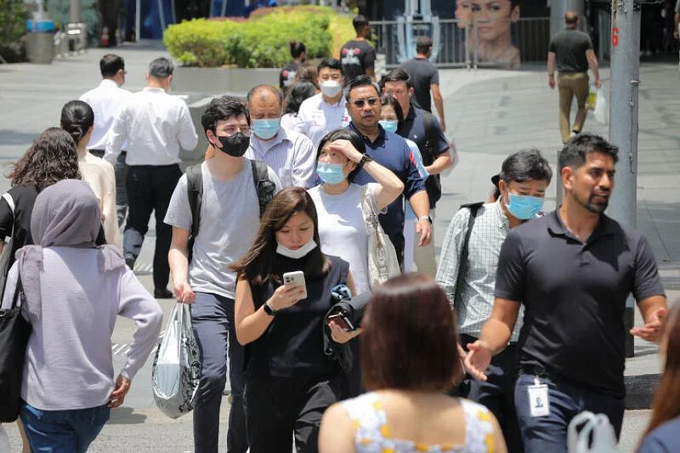
The number of Covid-19 cases in Singapore and some Asian countries is increasing rapidly again (Illustration photo: Straits Times).
Bloomberg cited data from Singapore's Ministry of Health as saying that the number of Covid-19 cases in the country nearly doubled in the last week of March, from approximately 14,500 cases to 28,000 cases, the highest since the beginning of the year.
India recorded more than 10,000 cases on April 13, the highest number since late August 2022. Although private hospitals and clinics have not seen a spike in patients, the Indian government this week asked health units to conduct epidemic response drills. Several states have re-issued regulations on wearing masks in public.
Meanwhile, the number of Covid-19 cases in Indonesia has reached a four-month high, at nearly 1,000 cases per day. President Joko Widodo yesterday urged people to get their second booster shot. However, he also affirmed that with the current level of immunity in the population, Indonesia is still in good control of the situation.
As the majority of the region's population has been vaccinated or previously infected with Covid-19, most Asian countries have lifted strict restrictions to open their economies and return to normal life.
In response to the new outbreak, many countries in the region have increased testing and reintroduced preventive measures. However, health officials in the region believe that this wave is mainly due to a combination of XBB subvariants - a highly transmissible Omicron strain that has not yet caused widespread severe disease.
According to the World Health Organization (WHO), the Omicron sub-variant XBB.1.16 has appeared in 20 countries, including Singapore, the US, the UK, Australia, but mainly India. This is the variant to watch. XBB.1.16 causes symptoms that are believed to be similar to previous variants, including fever, shortness of breath and cough. However, many people infected with this variant have symptoms of conjunctivitis.
Maria Van Kerkhove, WHO technical lead on Covid-19, said XBB.1.16 has an additional mutation that makes it more transmissible.
"This variant has been around since January. We haven't seen a change in severity in individuals or in communities. We're in a much better position than we were at the beginning of the outbreak. One of the big uncertainties we face going forward is the virus itself," Kerkhove said.
However, some experts say the rapid rise in cases shows that Covid-19 is still a concern. "We need to continue to be cautious. When a new variant arises, you have to find out whether it is more transmissible, more pathogenic, whether it is more pathogenic and what happens in terms of immune protection," emphasized virologist Lawrence Young at the University of Warwick (UK).
This speaks to the importance of monitoring the virus's genome, he said, but it seems many countries have let their guard down.
Source







![[Photo] Prime Minister Pham Minh Chinh chairs a meeting on the implementation of the Lao Cai-Hanoi-Hai Phong railway project.](https://vphoto.vietnam.vn/thumb/1200x675/vietnam/resource/IMAGE/2025/5/20/0fa4c9864f63456ebc0eb504c09c7e26)






















































































Comment (0)